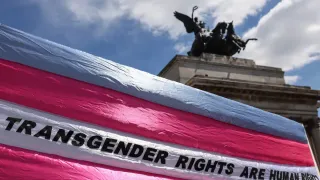
5 hours ago
Eurovision’s Nemo: Breaking the Code and Redefining Non-Binary Visibility in European Music
READ TIME: 3 MIN.
In May 2024, Swiss singer-songwriter Nemo Mettler achieved a historic milestone by becoming the first non-binary artist to win the Eurovision Song Contest, performing “The Code” — a gripping blend of operatic pop, rap, and drum-and-bass that explores the journey toward non-gender identity. Representing Switzerland, Nemo’s performance resonated globally, not just as a musical triumph but as a beacon for LGBTQ+ visibility within one of the world’s most-watched cultural events.
Eurovision 2024, hosted in Sweden, was marked by unprecedented political tensions and protests, primarily due to Israel’s participation during ongoing military actions in Gaza. Numerous delegations raised complaints, and mass boycotts underscored the event’s contentious atmosphere. Despite the controversy, Nemo’s victory stood out, earning top votes from international juries and viewers and bringing renewed attention to the contest’s roots as a celebration of diversity.
Nemo’s win was not only a personal achievement but also a political statement. After the finale, they revealed they had been banned from bringing a non-binary flag on stage—a rule they chose to defy regardless. This act underscored Eurovision’s fraught relationship with gender expression and highlighted the ongoing struggle for recognition faced by non-binary people across Europe.
Nemo’s journey continued with the release of their debut album, Arthouse, in 2025. The album is described as the center of a party where “everyone gets to be themselves,” filled with eclectic sounds blending funk, electroclash, and glam-pop. Tracks such as “God’s A Raver” and “Ride My Baby” infuse spiritual and cosmic themes into jubilant pop, while songs like “Frog Swamp” and the title track address the world’s cruelty and the urgent need for collective joy and hope.
Speaking from their new home in Paris, Nemo described the album’s duality: “I have my reality and I have my idea of the world and then this is living in the backdrop of the grander world, that is going through a f**king crazy time right now.” They emphasized the importance of music that is “hopeful and joyful without being ignorant,” reflecting both the vibrancy of queer celebration and the weight of contemporary issues.
Arthouse’s creation was deeply personal, with tracks like “Unexplainable” originating from moments of vulnerability, written in isolation and later transformed into powerful statements of self-revelation. Nemo’s artistry is marked by a constant negotiation between public scrutiny and private identity, especially as a gender non-conforming individual in the spotlight.
Nemo’s impact goes beyond music. Following their Eurovision win, they called on the Swiss government to legally recognize a third gender, referencing the 2022 rejection of such proposals. In interviews, Nemo highlighted the absence of legal recognition for non-binary people in Switzerland, stating that “we need to have the representation in our politics.” Swiss justice minister Beat Jans responded positively, expressing willingness to meet Nemo and discuss non-binary rights.
The wider impact of Nemo’s activism was reflected in statements by Green Party member Sibel Arslan, who underscored the urgency of official recognition: “a non-binary person who officially doesn't exist in Switzerland has won Eurovision 2024,” urging the Federal Council to act.
Nemo’s advocacy extended to international issues. Amid continuing war in Gaza, they publicly called for Israel’s exclusion from Eurovision 2025, asserting that “Israel’s actions are fundamentally at odds with the values that Eurovision claims to uphold — peace, unity, and respect for human rights”. Their stance amplified debates about the role of politics in cultural institutions and the responsibilities of artists as public figures.
Born in Biel/Bienne, Switzerland, to parents involved in entrepreneurship and journalism, Nemo’s upbringing was marked by artistic collaboration with family, including their photographer sister, Ella. Nemo’s name, meaning “no one” in Latin, reflects a philosophy of boundless possibility—“if I was no-one, I could become anyone.”
Nemo came out as pansexual in 2022 and as non-binary in 2023, choosing to use their given name in German and they/them pronouns in English. Their openness about identity has been instrumental in shaping public conversations about gender and sexuality in Europe, especially in traditionally conservative spheres.
From living in Berlin to London, and now Paris, Nemo’s international trajectory mirrors their role as a global advocate for LGBTQ+ rights. Their relationship with their girlfriend, who was their first confidante about being non-binary, highlights the importance of personal support amid public life.
Nemo’s Eurovision victory and subsequent artistic endeavors represent a significant shift in European music—one where non-binary and queer artists are increasingly visible and influential. Their refusal to adhere to restrictive norms, both on stage and in advocacy, has challenged institutions to reconsider policies and practices that exclude marginalized identities.
For many LGBTQ+ viewers and aspiring musicians, Nemo’s story is a source of hope and affirmation. Their music and activism affirm that joy, resistance, and self-expression are not mutually exclusive, even in turbulent times. As Nemo continues to build their career, their legacy is likely to shape future conversations about gender, art, and justice across Europe and beyond.






